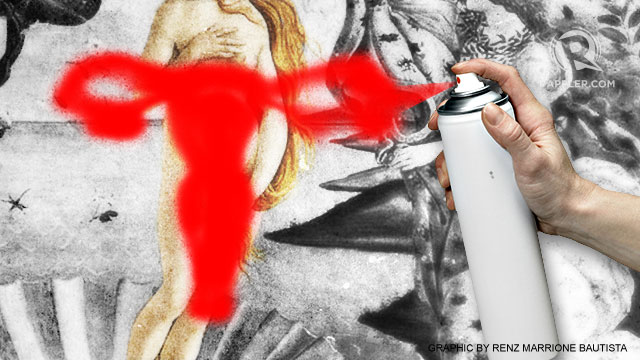SUMMARY
This is AI generated summarization, which may have errors. For context, always refer to the full article.
 As a tribute to Women’s Month, let me just say that I think nature made a mistake in inventing the menstrual cycle.
As a tribute to Women’s Month, let me just say that I think nature made a mistake in inventing the menstrual cycle.
This is because we humans are wired in such a way that when we encounter things that are literally bloody, we instinctively sense that danger lurks. We think that there is either wounding or downright mutilation involved.
It would of course be useful to be alerted this way about blood in violent situations or accidents. But this monthly bloody occurrence can really nicely come and go without the drama and commotion. And sadly, it’s not just the drama.
Akin to fear is also “disgust,” since anything with blood means it is open and fair game to contamination. This is probably why so many myths and superstition surround this biological process.
For certain tribesmen in New Guinea, to come in contact with women’s menstrual blood or a menstruating woman, will “corrupt his vital juices, permanently dull his wits and eventually lead to slow death.”
I don’t know about you but I have had no problem knowing of human males who were already devoid of elan vital, dull-witted, and who died anyway even if they had been deprived of the contact with menstruating women.
In the remote mountains of Nepal, menstruating girls are banished from their communities and placed in “menstrual huts” exposed to wild animals and other elements.
But menstruation is not dangerous, fearsome or disgusting. Nature just did not figure out another way to get rid of what women did not need if they were not pregnant.
Each month, a hormonal signal from the female brain’s pituitary gland, egged by her hypothalamus, causes dozens of bumps (follicles) to form in the ovary where each follicle contains an egg. But among all these, only one egg gets to mature and travel down the fallopian tube from the ovary to the uterus.
During this time, the uterus starts to form a lining that is rich in blood and nutrients. In the event that the mature egg meets a sperm cell from a man, dull-witted or otherwise, then the egg gets fertilized and if all goes well, a baby will form, protected by the lining in the uterus and in due course, be born.
But if sperm and egg do not hit it off, there would be no need for the uterine lining. Thus, it naturally sloughs off like dead skin. That is what comes out of the menstruating female.
If you were a biologist, you would probably think this process is beautiful in its own way. But if you were an economist, you may find that nature is quite messy, not to mention a great squanderer since it results in no less than a monumental waste of eggs.
This is because upon reaching puberty, a girl is known to possess 300,000 eggs. But in the course of her lifetime, she only releases around 400. The rest are decimated by nature herself (around 1,000 a month) as a matter course – and without any help from the Reproductive Health bill.
Last March 6, Colin Shultz came out with an article in Popular Science about how men learn what menstruation is really all about. He cited a 2011 study that tried to find this out and which revealed what most of us probably suspected: that in general, men just have a very hazy idea of what really happens during menstruation.
The good news from that study seems to be that as men mature in their relationships, they get to understand better their partner’s monthly rendezvous with her “inner sea.”
Comforting as that may be that some men may eventually “get it,” what about the others? And I don’t refer to men alone but women themselves who bought into the “menstruation is taboo” mumbo jumbo. This was the case with Arunachalam Muruganantham, the Indian man who lost his wife, mother and the respect of his community, but gained a sanitary pad.
Epic story
You can read about his full story here but I will give you a gist.
Muruganantham’s epic story started when it puzzled him that his own wife, Shanthi, was hiding a dirty cloth from him. He found out that this was what she was using for her period. When he asked her why she would not go buy a sanitary pad, she replied that if she did, they would have to forego milk, which was a basic need.

This deeply puzzled Muruganantham and in his own words in the audio interview he gave, he said, “This is a serious issue and some soul searching has to be done.”
In his research, he discovered that about two-thirds of Indian women used “non-sensical” materials as sanitary pads including ash, sawdust and sand. He said he felt so driven to find a solution because it felt like a “war within” himself and that he had to “persist to win the war.”
But finding a solution involved knowing for himself what it was like to menstruate. For this, he could not find volunteers. So he devised his own contraption (this involved a football, poked with holes through which tubes were attached, a pump and animal blood) so that he could experience menstruation for himself. He placed this inside his underwear and ran, walked and cycled with it to test it in different conditions.
The “self-participatory” experiment proved to be too much for the women in his life – his wife and his mom. So they left him. His own community thought he was possessed by evil spirits that they tried all sorts of “exorcism” in vain until he was banished from their home.
But he did not give up. Eventually he found the secret ingredient of sanitary pads, which was cellulose, and devised a machine that could make affordable sanitary pads to women in poor communities and also employ the women.
He became a social entrepreneur, and after a few years, his wife and mother came back. He is now engaged in talks with many countries to empower women to take charge of their own menstrual lives and perhaps, sharpen the sensitivities of dull-witted men who cannot love them when they have their monthlies.
What struck me most about him was what he defined as a “breakthrough.” He said it happened when he asked a girl how she felt that she was wearing a pad that he invented. She replied, “I was not even aware it is your napkin.”
The scourge of Eve is no longer and rendered even more powerful because it was genuine service in anonymity.
The scourge of Eve is the tale of an egg traveling solo, shedding some unnecessary baggage along the way. It is about dull-witted men who think that liquid baggage is responsible for their dark fate. It is about women who ignore the need to have an intimate understanding of their own bodies.
It is about one man busting the scourge and asking himself and in the process, the whole world: What profiteth a man to gain a sanitary pad and enrich his soul in the process? – Rappler.com
Maria Isabel Garcia is a science writer. She has written two books, Science Solitaire and Twenty One Grams of Spirit and Seven Ounces of Desire. Her column appears every Friday and you can reach her at sciencesolitaire@gmail.com.
Add a comment
How does this make you feel?
There are no comments yet. Add your comment to start the conversation.